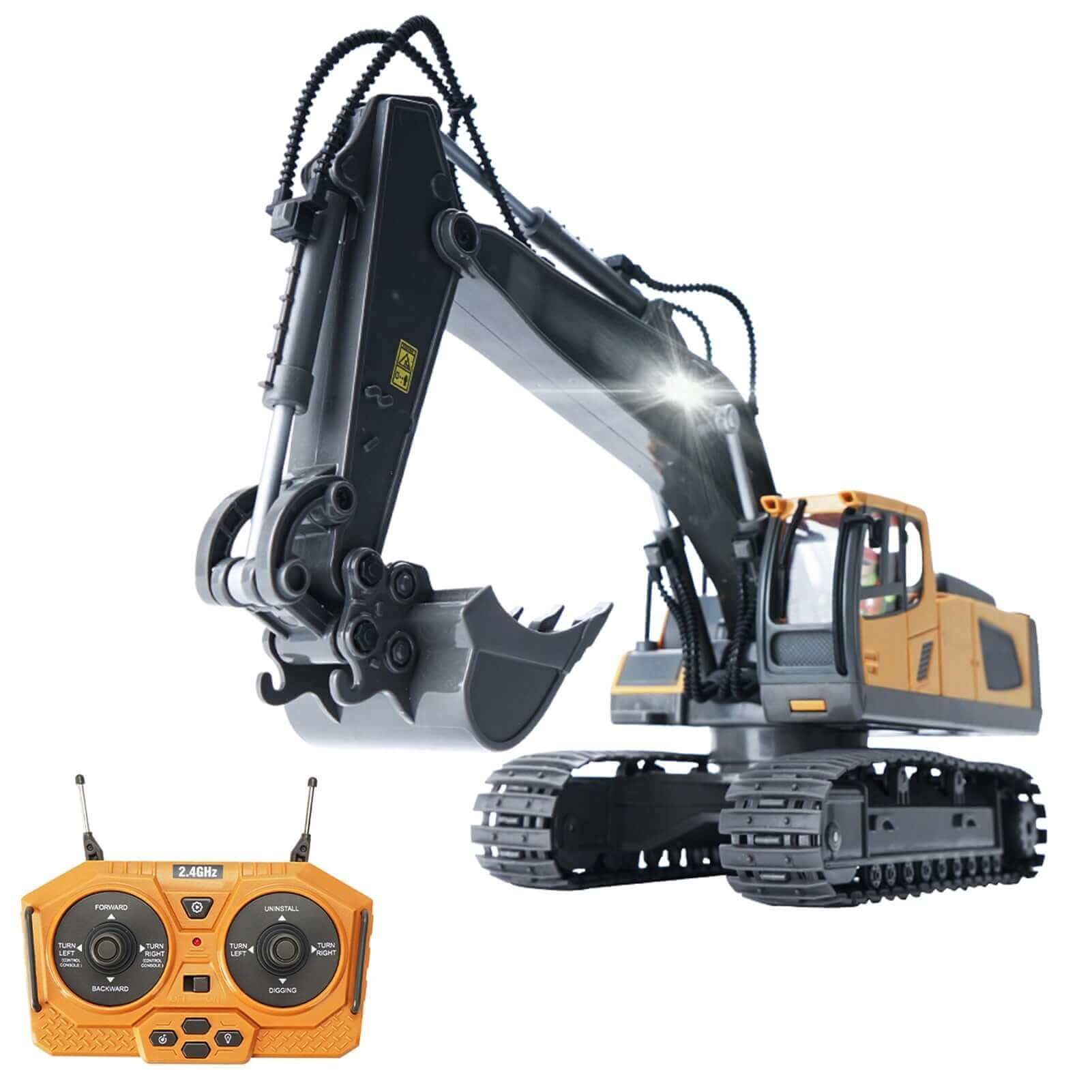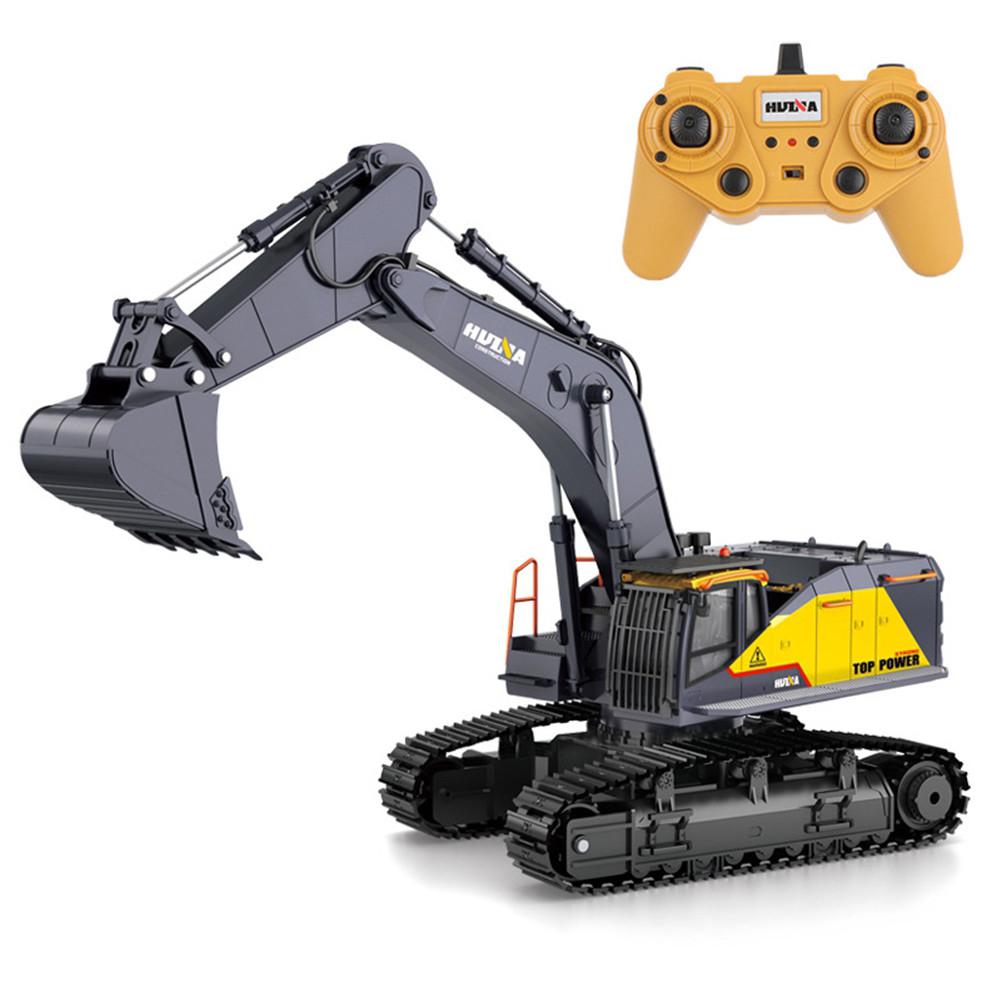A Comprehensive Overview of the Double E Volvo rc excavator and Its Features
Discover the Significance of Excavator in Modern Building Projects
Excavators are vital devices in contemporary construction jobs. Their flexibility allows them to execute a vast array of tasks, from excavating and grading to demolition and website preparation. Advanced features, such as hydraulic add-ons and general practitioners, boost their abilities and performance on job websites. As the industry develops, the significance of excavators expands also extra. Comprehending their duty can reveal insights right into the future of building practices. What exists ahead for these machines?
The Versatility of Excavators in Numerous Projects
Excavators are frequently associated with large-scale building and construction projects, their convenience allows them to be used in a wide variety of applications, from domestic landscaping to energy upkeep. In urban setups, excavators can browse limited rooms to dig foundations for homes or mount water drainage systems. Their capability to carry out fragile tasks makes them suitable for landscape design jobs, where they can excavate for fish ponds or plant trees. On top of that, excavators play a vital function in utility upkeep, efficiently digging trenches for pipes or cable televisions without interfering with surrounding areas. In farming applications, they assist in land clearing and dirt prep work. Their versatility enables them to be furnished with different accessories, enhancing their capability throughout various tasks. This diverse nature of excavators not only streamlines different building and construction processes but likewise shows their essential role in modern infrastructure development and upkeep.
Secret Attributes and Kinds Of Excavators
The discussion on crucial functions and kinds of excavators highlights the essential characteristics that make these makers indispensable in construction. Various excavator types, each created for details jobs, demonstrate their convenience and performance throughout different applications. rc excavator. Understanding these functions and categories is essential for optimizing their use in modern-day building and construction jobs
Excavator Keys In Summary
Excavators play a crucial function in contemporary construction, offering versatility and effectiveness throughout numerous jobs. These heavy equipment devices come in a number of kinds, each customized for details applications. One of the most usual kinds consist of spider excavators, known for their stability on irregular terrain, and rolled excavators, which offer higher mobility on paved surfaces. Miniature excavators are preferred for small-scale jobs and tight rooms, while long-reach excavators are designed for deep digging. Furthermore, there are specialized excavators, such as hydraulic excavators, which improve power and precision. Each type features special capacities, making them crucial for tasks varying from digging and grading to demolition and material handling. Understanding these variations enables construction professionals to choose the right excavator for their job requires.
Secret Features Explained
Comprehending the crucial functions of excavators improves their effective application in construction tasks. Excavators are identified by their powerful hydraulic systems, which supply the necessary pressure for excavating, lifting, and relocating materials. Their expressed arms enable a broad array of activity, helping with precise operations in restricted rooms. Furthermore, the range of add-ons, such as containers, grapples, and augers, increases their adaptability to meet different job needs. The dimension and weight of excavators also add to their security and ability to move on different surfaces. Moreover, advancements in modern technology have resulted in the integration of general practitioner and automation, enhancing accuracy and efficiency in excavation jobs. These attributes collectively place excavators as indispensable tools in modern-day building and construction.
Applications in Construction
Changing construction websites, excavators play a critical function throughout different applications, varying from household building tasks to large framework developments. These functional makers are outfitted for jobs such as digging foundations, trenching for utilities, and site grading. Different kinds of excavators, including spider, rolled, and mini excavators, provide particular benefits customized to the task demands. Spider excavators succeed in rough terrains, while wheeled excavators offer wheelchair on smooth surfaces. Miniature excavators are suitable for confined areas, making them popular in metropolitan setups. The effectiveness and power of excavators substantially quicken building and construction processes, guaranteeing prompt task completion. Their adaptability better improves their value, enabling building and construction groups to take on a diverse selection of obstacles successfully.
Enhancing Performance and Efficiency on Task Sites
Maximizing efficiency and performance on work websites is a critical objective in contemporary construction. Excavators play a critical duty in attaining this goal by enhancing various jobs. Their capacity to do several features-- such as lifting, excavating, and grading-- decreases the need for added devices, thereby conserving time and resources.Moreover, excavators enhance workflow by permitting faster completion of tasks. With advanced functions like hydraulic add-ons and GPS technology, they can implement accurate operations that lessen errors and revamp. This precision not just enhances the top quality of job yet also enhances material usage, adding to cost savings.The versatility of excavators permits them to adjust to different site problems, making sure that projects progress efficiently no matter challenges. By integrating excavators right into building and construction processes, teams can significantly increase their overall performance, causing timely project completion and enhanced profitability.
Security Benefits of Making Use Of Excavators
Excavators significantly enhance safety and security on building and construction websites through enhanced operator exposure and minimized manual labor dangers. By supplying operators with a clear view of their environments, excavators help to avoid injuries and mishaps. In addition, the machinery minimizes the requirement for workers to involve in hazardous hand-operated jobs, further advertising a much safer workplace.
Boosted Driver Visibility
Although building and construction sites can be disorderly and loaded with potential hazards, improved operator visibility plays a necessary role in guaranteeing security when utilizing excavators. Modern excavators are created with huge, unblocked windows and purposefully placed mirrors, enabling drivers to preserve a clear view of their surroundings (rc excavator). This enhanced visibility is important for identifying pedestrians, other machinery, and various barriers, significantly decreasing the risk of crashes. In addition, several excavators include advanced technology, such as sensing units and electronic cameras, to supply drivers with additional perspectives, further boosting awareness. The ability to see more clearly not just aids in efficient operation yet likewise fosters a safer workplace, making it simpler for drivers to navigate intricate building websites without compromising safety and security criteria
Minimized Manual Labor Dangers
When manual work is decreased through using excavators, various safety and security benefits arise, considerably enhancing the wellness of building and construction employees. Excavators decrease the physical stress associated with heavy lifting and repeated jobs, efficiently decreasing the threat of bone and joint injuries. By automating procedures such as excavating, grading, and relocating products, they allow employees to maintain a safer distance from prospective threats. Furthermore, excavators are outfitted with innovative safety and security features, such as rollover defense systems and enhanced operator comfort designs, which better protect workers on website. The outcome view it is a considerable decrease in office accidents and injuries, bring about enhanced efficiency and spirits amongst building groups. Inevitably, the adoption of excavators adds to a more secure and much more efficient building atmosphere.
Excavators in Earthmoving and Website Preparation
In modern building, a significant part of earthmoving and site prep work tasks depends on the performance and versatility of excavators. These machines are designed to handle numerous dirt types and terrain, making them important for grading, excavating, and trenching activities. Their hydraulic arms can be outfitted with various accessories, such as augers and pails, permitting drivers to tailor their method based upon certain job requirements.Excavators stand out at moving large volumes of earth quickly and efficiently, which accelerates the total building timeline. They can browse tight rooms and testing sites where standard equipment might struggle, boosting performance. Furthermore, the accuracy of excavators warranties that website prep work complies with rigorous specs, reducing the threat of errors that can bring about costly rework.
The Function of Excavators in Demolition Tasks
Excavators play learn the facts here now a necessary role in demolition tasks, as they have the power and dexterity required to take apart frameworks successfully. Furnished with different attachments such as hydraulic breakers, shears, and grapples, these makers can adjust to different demolition needs, whether for small structures or large industrial sites. Their convenience allows drivers to tackle complicated tasks while maintaining security and precision.In addition to their demolition capacities, excavators promote particles elimination, guaranteeing that work sites continue to be orderly and risk-free. By breaking down structures into manageable items, they enable streamlined cleaning and recycling of materials, lining up with contemporary sustainability efforts.Moreover, excavators can access limited areas and browse unequal surface, making them indispensable in metropolitan demolition jobs. In general, their durable layout and multifunctionality make excavators an important property in the demolition phase of building, adding considerably to job timelines and performance.


Future Patterns in Excavator Innovation and Usage
As the construction industry progresses, improvements in excavator innovation are positioned to change their usage and efficiency significantly. One considerable pattern is the integration of automation and expert system, allowing excavators to run with marginal human treatment. This shift will improve precision in jobs such as grading and trenching, minimizing human error and boosting productivity.Additionally, the increase of electrical and hybrid excavators is forming a more lasting building setting, lowering carbon emissions and gas expenses. Boosted telematics systems are likewise arising, making it possible for real-time monitoring of equipment efficiency and upkeep needs, which can bring about far better operational efficiency and longer equipment lifespan.Moreover, developments in attachment technology are increasing the flexibility of excavators, allowing them to perform a more comprehensive variety of jobs. The combination of these patterns demonstrates a future where excavators are smarter, greener, and more adaptable, inevitably reshaping building job characteristics.
Often Asked Concerns
How Do Excavators Compare to Other Building And Construction Machinery?
Excavators, characterized by their convenience and power, master digging and earthmoving contrasted to various other equipment. Their capability to perform various tasks, consisting of training and demolition, makes them vital in building and construction projects, boosting general efficiency.

What Is the Ordinary Life Expectancy of an Excavator?
The typical life-span of an excavator typically ranges from 7,000 to 10,000 operating hours, depending upon upkeep, use problems, and model. Correct care can expand this life expectancy, making sure peak efficiency throughout its operational years.
How Are Excavators Preserved for Optimal Efficiency?
Excavators call for normal maintenance for peak performance, including regular examinations, liquid checks, filter substitutes, and prompt repair services. Executing a precautionary maintenance routine aids extend their lifespan and assurances effective procedure in numerous construction atmospheres.
What Are the Prices Related To Leasing vs. Purchasing an Excavator?
The costs related to getting an excavator versus leasing vary substantially. Leasing deals lower upfront costs but my company can gather in time, while purchasing needs a significant first investment, however offers lasting cost savings and property possession benefits.
What Training Is Needed to Operate an Excavator?
Operating an excavator calls for specialized training, normally consisting of safety and security procedures, maker operation techniques, and ecological awareness. Accreditation programs usually mandate practical experience, making it possible for drivers to take care of numerous jobs successfully while guaranteeing conformity with industry regulations. The most typical types include spider excavators, recognized for their security on uneven terrain, and rolled excavators, which give higher movement on smooth surfaces. Mini excavators are favored for small-scale projects and limited areas, while long-reach excavators are made for deep digging. Additionally, there are specialized excavators, such as hydraulic excavators, which enhance power and precision. Various types of excavators, including spider, wheeled, and mini excavators, provide certain benefits tailored to the project needs. Crawler excavators excel in harsh terrains, while wheeled excavators use flexibility on paved surfaces.